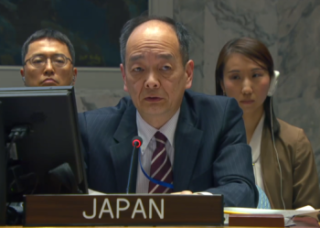文民保護に関する安保理会合における山中大使ステートメント
令和6年2月27日

(As delivered)
Thank you, Madam President,I’d like to start by thanking Mr. Rajasingham, Mr. Martina, and Mr. Skau for providing detailed and sobering briefings.
The update on food security risks in Gaza delivers nothing but extremely alarming facts. It is deeply distressing to discover that the entire population of 2.2 million people in Gaza will face high levels of acute food insecurity by the end of this month, and 1.1 million children in Gaza are now facing starvation. An aid worker for Save the Children on the ground saw people eating bird and animal food and tree leaves, and scavenging food that has already been eaten by rats out of desperation. As indicated in the briefing, this is one of the worst food insecurity situations we have ever witnessed.
To address the grave situation in Gaza, the Government of Japan has announced today an additional 32 million USD in Emergency Grant Aid to provide assistance in the fields of food and health among others.
I wish to underscore three points that are most critical to prevent conflict-induced famine and widespread food insecurity in Gaza.
First, all parties to the conflict must respect International Humanitarian Law. International Humanitarian Law clearly prohibits attacking, destroying, removing, or rendering useless objects that are indispensable to the survival of the civilian population. These include food stuffs, agricultural areas, crops, livestock, drinking water installations and supplies, and irrigation works. IHL also requires parties to the conflict to allow and facilitate rapid and unimpeded passage of humanitarian assistance for civilians. This message has been numerously repeated inside and outside of this chamber, but we will continue to repeat this call until we see these rules are followed.
Second, more humanitarian aid coordination between relevant parties is needed to meet the enormous humanitarian requirements on the ground. WFP recently announced that they have been forced to pause food distributions in northern Gaza, and many other humanitarian organizations are echoing the difficulties in delivering aid. It is vital to allow more trucks and fuel to reach Gaza and we urge Israel to open additional border crossings and secure humanitarian corridors so that humanitarian actors can safely carry out their work. We also strongly support the efforts of UN Senior Coordinator Ms. Sigrid Kaag to overcome the many impediments to reaching those in need.
Finally, even as we demand the remedy of the humanitarian situation, we must continue our efforts to address the cause of this catastrophe. In this vein, Japan once again unequivocally condemns the heinous acts of terror by Hamas and others on October 7th, which has led to a series of tragedies. We demand the immediate and unconditional release of all remaining hostages held by Hamas and other groups.
At the same time, Japan also reiterates that a humanitarian ceasefire needs to be realized promptly to ensure a conducive environment for sufficient humanitarian assistance activities as well as to lead to the release of the remaining hostages, therefore resulting in the realization of a sustainable ceasefire. Based on this position, Japan calls on all the parties concerned to act immediately from a humanitarian viewpoint.
Madam President,
This humanitarian catastrophe must be immediately stopped. Japan will continue to work with other Council members and the international community to alleviate the plight of the people in Gaza.
I thank you, Madam President.
